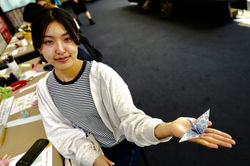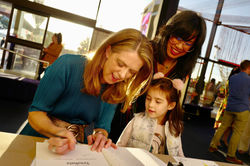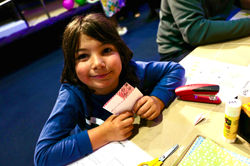
OUR WORK
Tanabata: Star Village with Slow Art Collective
Presenter
OzAsia Festival, Adelaide Festival Centre
Curator
Kathryn Hunyor, Director ArtsPeople
Artists
Slow Art Collective (Chaco Kato & Dylan Martorell)
ArtsPeople Team
Narelle Lewis (Senior Producer)
Luke Suivi (Digital Producer)
Haline Ly (Illustrator & identity design)
Tony Maniaty (Creative Advisor & Photography)
Noriko Tadano (Live storyteller)
Shingo Usami (Video performer and storyteller)
Alexandra Moutevelidis (Video music composer)
Shani Engelbrecht, Shenshen Zheng, Tsz Tung (Nicky) Li, Montana Flora, Jazmine Deng, Jake Yang (crew and artist assistance).
Media Highlights
Links
Adelaide Festival Centre article
Credits
Photography: Tony Maniaty
Numbers
10,000 + over two weeks
Dates
24 October – 10 November 2024
Concept
Tanabata: Star Village is an immersive, participatory art experience for audiences of all ages, inspired by the traditional Japanese Tanabata festival. An ArtsPeople production for the 2024 OzAsia Festival in Adelaide, ‘Tanabata Star Village’ celebrates the love story of two stars – the princess Orihime and the cow herder Hikoboshi. During the Tanabata season in Japan, people fold origami decorations and write their annual wishes on ‘tanzaku’ cards to hang on bamboo branches in the streets, a celebration of universal hopes and dreams for the year ahead.
The Artists
Chaco Kato is a renowned contemporary artist based in Melbourne, specialising in large-scale, site-specific installations in both urban and rural contexts. Born in Japan, Chaco has been based in Australian since 1996. In 2008, with fellow artist Dylan Martorell, she founded Slow Art Collective, which advocates the slow absorption of culture through community engagement, focusing on environmental sustainability, material ethics, DIY culture and collaboration.
Sydney-based Japanese actor Shingo Usami hosted and narrated a video presentation for children, using the Tanabata book as the visual content to tell the story.
Our Approach
Tanabata: Star Village was devised by curator Kathryn Hunyor in collaboration with the artists Chaco Kato and Dylan Martorell. Kathryn, Director of ArtsPeople, brings many years of experience in the arts, and with Japan, to the project.
In an era of digital overconsumption, Tanabata becomes a chance to engage the hands with simple materials and tools – paper, scissors, coloured threads – to create unique works that can be shared with others. The Tanabata ‘construction’ for OzAsia started out small and grew into something big and beautiful – a message that working together can create impact, and leave lasting impressions on children.
Tanabata shows that anyone - at any age, young or old - can join in and make art, that making art can be great fun, and that ‘art’ - far from being exclusive - belongs to everyone.
The Project
In the foyer of the Adelaide Festival Centre, children and families discovered the Tanabata legend through hands-on art making, interactive storytelling and artistic collaboration surrounded by wonderfully intricate structures of bamboo, string and other materials.
Combining play with creativity, Festival visitors hung their ‘tanzuku’ wishes, origami and kirigami decorations, and weavings through a colourful, multi-level labyrinth - a tactile example of sustainability in action, illustrating the value of using recycled and low-cost, low-impact materials to create works of random, unexpected beauty. As in the Tanabata story itself, the gallery-standard installation gave children (and adults) at the 2024 OzAsia Festival the chance to reflect, to dream and place hope in the future.
Attendances were strong – more than 10,000 people flowed through the Tanabata installation in the two weeks of OzAsia.
Japanese musician and performer Noriko Tadano gave live storytelling sessions to students from eight Adelaide schools, while Tanabata was the VIP event for the launch of the OzAsia Festival, opened by the SA Arts Minister Andrea Michaels.
 |  |  |  |
|---|---|---|---|
 |  |  |  |
 |  |  |  |
 |  |  |  |
 |  |  |  |
 |  |  |  |
 |  |
